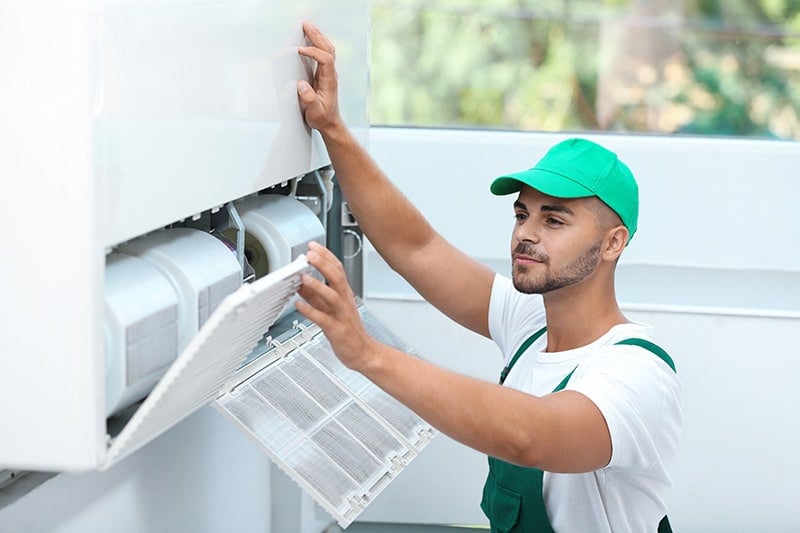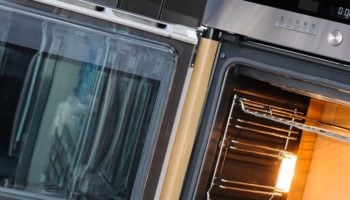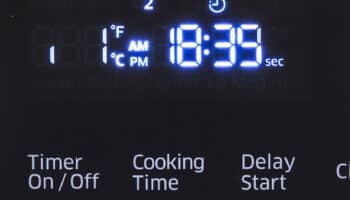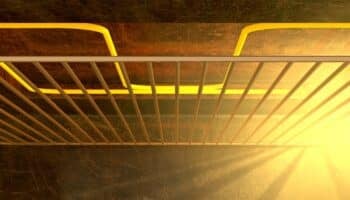We've independently reviewed this article to make sure it's as accurate as we can make it.
To find out more about our article creation and review process, check out our editorial guidelines.
Is your oven leaking water?
You’re not alone! I know how annoying it can be to be unable to use your oven because there’s a water leak.
But don’t worry; I’m here to help.
If your oven is leaking water, chances are the internal window seal is faulty, or there’s a significant difference between the oven and ambient temperature. Pay attention to the temperature in your room, consider replacing the window seal, and check the fan.
Keep reading to get your oven working again today!
Why trust us? This article was written by Craig Anderson and James Blackford.
Craig has helped thousands of other homeowners repair their appliances since 2016.
James is one of our resident appliance experts with over 16 years of experience. He currently works as a Master Technician for SquareTrade, and runs his own appliance repair business.
How To Stop Your Oven From Leaking Water: 4 Simple Steps
In this section, I’ll guide you through all the possible reasons for a water leak in your oven and provide different solutions.
#1 Condensation
In my experience, water in ovens can leak due to condensation.
You see, condensation forms when hot air from the oven comes into contact with the cold exterior.
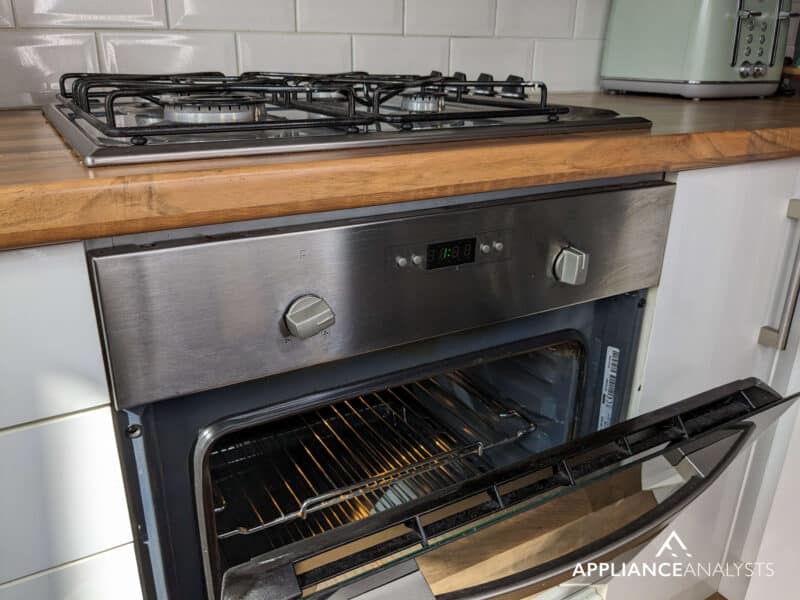
Fortunately, you can easily solve the problem by paying attention to the ambient temperature in the room.
Make sure your kitchen is at least 70 degrees Fahrenheit when you cook.You just have to increase the ambient temperature while cooking because when the oven is not turned on, the difference between the oven and the rest of the kitchen is relatively minimal.
#2 Issues With the Internal Window Seal
If your oven is leaking water, there’s probably an issue with the internal window seal.
When the internal window seal is faulty, the steam will start to escape from the oven. Steam has a significant amount of water, which will condense on your door as it leaves, resulting in a water leak.
I find that in older oven models, the rubber seal on the window can deteriorate and crack over time. In such cases, you’ll need to replace it. You can purchase a variety of window seals online, or you can even visit your local home improvement store.
When you replace your window seal, your oven should not have to work as hard to maintain its internal temperature. As a result, it should use less energy, helping you save money on your utility bills. Take a closer look at the inner window seal of your oven and see if it has to be replaced.
If you want to get any replacement part – or see how much one would cost – click to enter your model number in the search bar below. Our partners at AppliancePartsPros stock almost every part with free guides on how to install them.

#3 A Faulty Fan
When I see a water leak in an oven, it’s usually because the fan is having problems.
The fan is responsible for cooling the oven and its windows. It also takes the vapors in the oven, puts them into the kitchen, and protects the appliance from harm.
So, if there is a problem with the fan, then the vapors will remain inside your oven. Eventually, the vapors will work their way between the window panels of your oven, resulting in a condensation problem.
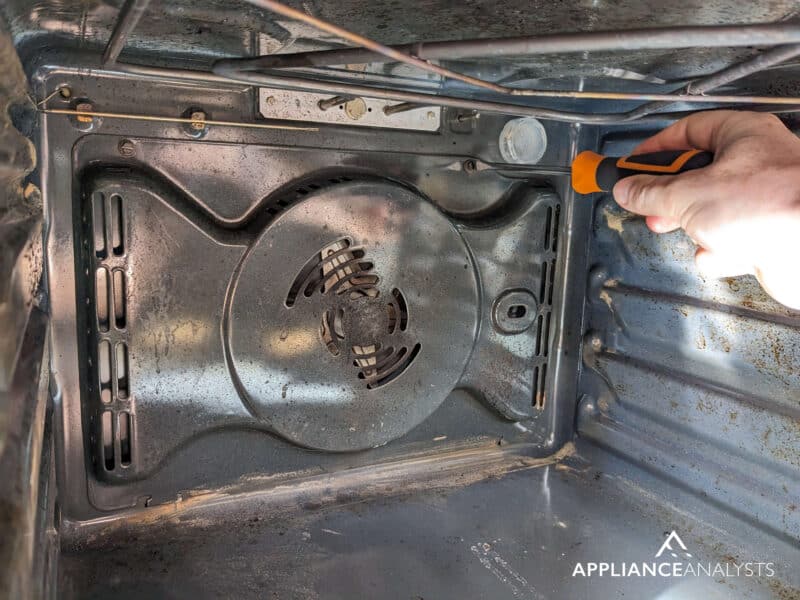
It is unusual for a tangential fan to break in an oven; however, if you have had yours long enough, it could happen eventually. You can look at replacement parts, finding the right one for your oven.
Even though some people can replace the fan on their own, you can also ask a professional to help you. Always place safety first when you are working with heavy machinery.
#4 Your Cooking Produces a Lot of Steam
Finally, if there’s a water leak in your oven, you are likely cooking food that produces a lot of steam.
In addition to paying attention to the parts responsible for removing steam from the oven, you also need to consider the food you are cooking.
If you want to stop water leaks, try cooking food that doesn’t give off a lot of steam. Even though this is not the ideal solution, it is a way to reduce the water coming from your oven.
You can also think about switching to different pieces of cookware. For example, put a pan underneath your meat to catch the juices and reduce the steam you produce.
It’s worth mentioning that your oven should be able to handle whatever you throw at it. So, if you believe your oven is having difficulty accommodating the amount of steam you are producing, please look at some of the other components mentioned above.
FAQs: Understanding Oven Water Leaks
Now, let’s answer some of the most common questions homeowners ask me about water leaks in an oven.
Is It Normal for an Oven to Leak Water?
It’s normal for ovens to have condensation on the door from time to time.
Even though condensation is not necessarily bad, you need to ensure the water does not leak onto your floors. Otherwise, there’s probably something wrong with the internal components, and the water leak could cause significant damage.
How Long Is an Oven Supposed to Last?
In my experience, a well-maintained oven can last over ten years. However, keep in mind that the lifespan can vary depending on its model, maintenance, and brand.
Just because your oven leaks water doesn’t necessarily mean you have to replace it. As long as you take care of your oven, it should last for decades.
Do I Need to Call a Professional to Help Me Fix My Oven?
Not necessarily. The decision to call a professional will depend on the problem and how comfortable you are with fixing your oven.
Some people are more comfortable calling a professional for help with anything related to the other, while others would like to do things on their own. Always put safety at the top of your list when working on your oven.
Final Thoughts: Your Guide to a Leak-Free Oven
Hopefully, now you know how to fix the water leak in your oven.
Remember, water in ovens can leak due to condensation, so you’ll need to pay attention to the ambient temperature while cooking. Don’t forget to check the window seal and fan or use different cookware.
Thank you so much for taking the time to read this article. If you found it helpful, please check out our other related posts below.
Have a great day!

